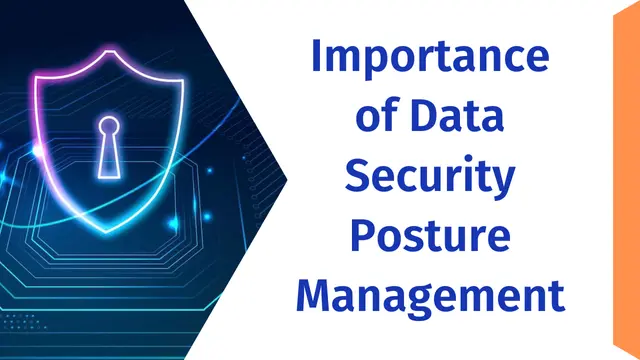
In today’s digital age, businesses handle vast amounts of sensitive data, making robust data security posture management (DSPM) crucial. Effective data security management helps organizations identify vulnerabilities, protect data assets, and comply with regulatory requirements. DSPM solutions provided by leading data security vendors enable businesses to enhance their security posture, ensuring data integrity and confidentiality. As cyber threats evolve, relying on trusted DSPM companies becomes essential for preventing data breaches and maintaining operational resilience. This article explores the significance of DSPM, its benefits, and why businesses should prioritize it.
What Is Data Security Posture Management?
Data Security Posture Management (DSPM) is a comprehensive approach to safeguarding an organization’s data assets by continuously assessing, monitoring, and improving security measures. It provides visibility into data security risks, enabling businesses to mitigate threats and ensure compliance with industry standards proactively. DSPM identifies data vulnerabilities across cloud and on-premises environments, enforces security policies, and automates responses to potential breaches.
With the rise of cyberattacks, DSPM plays a critical role in minimizing risks by offering insights into data access patterns, encryption levels, and overall security hygiene. Organizations leveraging DSPM can achieve a proactive security stance, mitigating risks before they escalate.
How Does DSPM Work?
DSPM integrates advanced technologies such as artificial intelligence (AI), machine learning (ML), and automation to provide real-time insights into an organization’s security landscape. The core functionalities of DSPM include:
- Data Discovery and Classification – DSPM identifies sensitive data stored across multiple environments and categorizes it based on its importance and regulatory requirements.
- Continuous Monitoring – It monitors data access, user behavior, and security policies to detect anomalies and potential threats.
- Risk Assessment – DSPM services evaluate security gaps and provide actionable recommendations to strengthen an organization’s security posture.
- Compliance Management – Ensuring adherence to industry regulations such as GDPR, HIPAA, and CCPA to avoid legal penalties.
- Automated Remediation – DSPM solutions enable automated incident response, reducing manual efforts and improving response times.
By implementing DSPM, organizations can gain better visibility and control over their data security landscape.
Benefits of DSPM
Effective data security posture management offers numerous benefits, ensuring organizations can protect their critical data assets while meeting compliance requirements. Investing in reliable DSPM solutions from top data security vendors enhances an organization’s security posture, enabling proactive threat mitigation and risk reduction.
Key Benefits
- Enhanced Data Visibility – DSPM provides a clear view of where data resides, who accesses it, and how it is used across the organization.
- Proactive Threat Detection – Continuous monitoring and analysis help detect suspicious activities before they lead to data breaches.
- Improved Compliance – DSPM simplifies compliance with regulatory requirements, reducing the risk of legal penalties.
- Automated Security Processes – Reduces human intervention through automation, minimizing errors and response times.
- Cost-Effective Risk Management – Early identification of vulnerabilities helps prevent costly security incidents.
- Scalability and Flexibility – DSPM solutions adapt to an organization’s growing data security needs.
Importance of DSPM
The growing complexity of IT infrastructures and the increasing sophistication of cyber threats make DSPM essential for businesses. Without a robust DSPM strategy, organizations risk data breaches, financial losses, and reputational damage. Engaging with leading DSPM companies ensures a proactive approach to data protection and risk management.
Why Is DSPM Important?
- Data Protection Across Environments – DSPM helps secure data across cloud, hybrid, and on-premises infrastructures.
- Regulatory Compliance – Ensures organizations meet data protection regulations and avoid hefty fines.
- Risk Reduction – Identifies and mitigates potential security gaps before they are exploited.
- Business Continuity – A strong security posture ensures operational resilience against cyber threats.
- Customer Trust – Enhancing data security boosts customer confidence and strengthens brand reputation.
Why Businesses Need DSPM?
Businesses today face an evolving cyber threat landscape, making DSPM a necessity rather than an option. Some of the reasons why businesses need DSPM include:
- Data Growth Management: The exponential growth of data makes it challenging to track and protect assets effectively.
- Cloud Adoption Challenges: As more businesses migrate to the cloud, securing data across distributed environments becomes complex.
- Regulatory Pressures: Businesses must comply with increasing data security regulations.
- Cost of Data Breaches: Data breaches’ financial and reputational impact can be catastrophic.
- Proactive Security Measures: DSPM enables businesses to stay ahead of cyber threats by adopting a proactive approach to security.
DSPM vs. CSPM
While data security posture management (DSPM) and Cloud Security Posture Management (CSPM) share similarities, they focus on different aspects of security:
| Aspect | DSPM | CSPM |
| Focus | Data security and compliance | Cloud infrastructure security |
| Scope | Data across all environments | Cloud-specific security |
| Key Functions | Data discovery, risk assessment, compliance management | Misconfiguration detection, cloud security policies |
| Tools Used | Data classification tools, encryption, AI-based monitoring | Cloud security monitoring tools |
Organizations often use DSPM and CSPM to ensure comprehensive security coverage across their IT ecosystems.
Conclusion
Implementing robust data security posture management is crucial for protecting business-critical data assets and ensuring compliance with regulatory standards. DSPM solutions offered by reputable data security vendors provide businesses with enhanced visibility, proactive threat detection, and automated security measures. To safeguard your organization’s sensitive data and maintain compliance, consider leveraging DSPM solutions from Circle MSP today. We help organizations strengthen their security posture and mitigate potential risks effectively.
